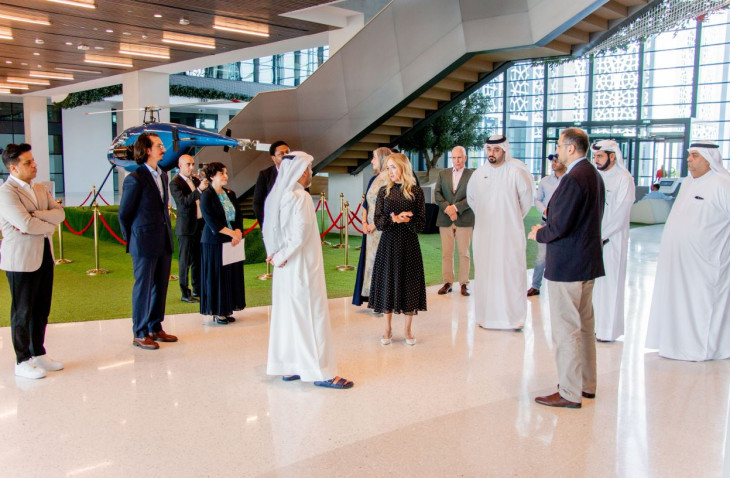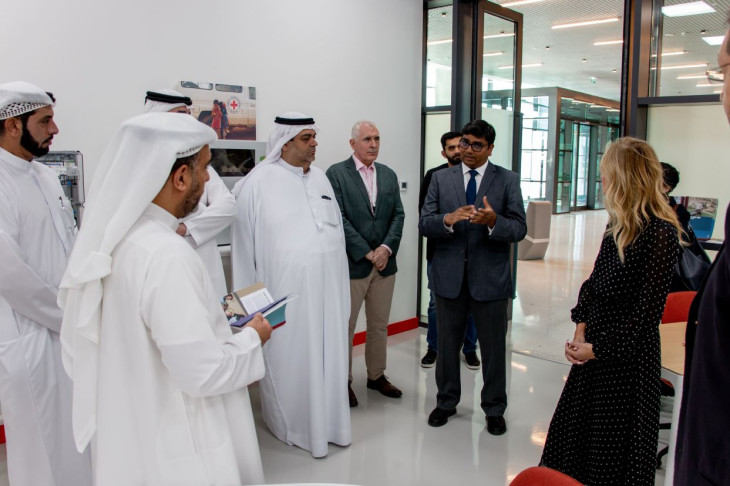The Energy and Water Knowledge Hub, located at the SRTIP, will host in-person classes, and provide technical laboratories to train ICRC staff and other organizations, nurturing expertise in sustainable energy solutions, notably renewable energy.
Clare Dalton, ICRC’s Head of Delegation in the UAE, said, “Climate change has global repercussions, but those in fragile environments feel its harshest impacts. The dual challenges of climate change and conflict exacerbate inequalities and suffering”. Dalton added, “This kind of collaboration with our UAE counterparts underscores the power of pooling expertise and best practices to amplify our collective ability to address humanitarian challenges together. The UAE’s commitment to environmental stewardship, innovation, and humanitarian action makes it the ideal location for this regional Hub. The Hub’s establishment is timely, especially as the UAE prepares to host the COP28 at the end of November”.
Hussain Al Mahmoudi, CEO of SRTIP, said, “As the region’s fastest growing and vibrant technology park, SRTIP is pleased to partner with ICRC to set up the region’s first Energy and Water Knowledge Hub. At SRTIP, we are at the forefront of initiatives focused on finding innovative solutions in the fields of water and energy by supporting startups that are driven by innovation and sustainability. The launch of this hub couldn’t have come at a more opportune time, as the UAE is all set to host the COP28 event in Dubai, to be attended by some of the biggest players engaged in combating climate change. We assure our full support to ICRC, other humanitarian bodies and all those who will be using this facility in the interest of sustainable energy solutions.”
The holistic training facility in the UAE will integrate advanced renewable energy training with foundational humanitarian operation modules, targeting a diverse audience from various sectors, such as academia, the private sector, development, and other humanitarian organizations that run energy projects and face similar challenges to find innovative sustainable solutions that draw on new technologies.
Joe Battikh, Head of ICRC’s Energy & Water Knowledge Hub, shared, “Our team has eagerly awaited this initiative as we have lots of studies and input from our experts, staff, and partners to support this endeavor. Climate change mitigation and promoting sustainability in our humanitarian operations is a top priority, and we’re geared to make global impacts with our partners to support impacted communities”.
The Hub’s strategic partners, Schneider Electric, Grundfos, the Paul Due Jensen Foundation, and SRTIP, have also contributed to this initiative. The first training session for ICRC engineers from the region kicked off on 6 November 2023, with further sessions lined up for the subsequent years, which are open to interested partners and organizations to train and have their staff trained.

About Sharjah Research, Technology and Innovation Park (SRTIP)
Sharjah Research, Technology and Innovation Park (SRTIP) is an institution located in Sharjah, United Arab Emirates. Established in 2016, SRTIP is focused on promoting research, technology, and innovation in various fields, including healthcare, energy, environment, and technology. The institution aims to create a collaborative platform for academic institutions, businesses, and government agencies to work together in order to promote innovation and entrepreneurship. SRTIP provides a range of facilities and services to its members, including cutting-edge laboratories, research and development facilities, training programs, and funding opportunities. The institution’s goal is to create a knowledge-based economy in the region by promoting research, innovation, and entrepreneurship. SRTIP is committed to supporting the UAE’s vision of becoming a global leader in science and technology.

About The International Committee of the Red Cross (ICRC)
The International Committee of the Red Cross (ICRC) is a neutral, impartial and independent organization with an exclusively humanitarian mandate that stems from the Geneva Conventions of 1949. It helps people around the world affected by armed conflict and other violence, doing everything it can to protect their lives and dignity and to relieve their suffering, often alongside its Red Cross and Red Crescent partners.
We acknowledge Source link for the information.




